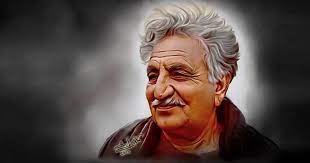
Article by
Khan Abdul Ghani Khan was a Pakhtoon philosopher and Pashto poet, artist (painter and sculptor). He was the son of great influence and leader of Pakhtoons Khan Abdul Ghafar Khan also known as Bacha Khan(The founder of nonviolent revolution “Khudai Khidmatgar” “servants of God”) and brother of Khan Abdul Wali khan. Ghani Khan was born in January 1914 in Hashtnagar NWFP (North-West Frontier Province of British India) It was then a reasonably sized village, now a largely populated town and is known as “Utmanzai” which is located in District Charsadda KPK(Khyber Pakhtunkhwa).
As I begin my translation, I would like to honour Ghani Khan’s poetic creativity. Motivated by his elegant poems, I want to convey similar feelings with my own narrative, a true tribute to the profound meaning of his poetry.
A Poppy Flower
In a desert, once, on a hunt did I find,
With a radiant smile, a flower so fair;
Sadly, I approached and sighed, “Ah! Of my kind
Are you too – a hapless flower from a beloved's hair.
Frail fingers wouldn't take you to a soft face so close,
Nor would you be kissed by delicate lips and roses.”
Ghani Khan, wandering through a big, dry desert. Suddenly, he spots a beautiful flower with a happy smile, like a lovely surprise in a tough place. But here's the thing, Ghani Khan, feeling a bit sad, thinks the flower is a bit like him, kind of out of place in the desert when it should be somewhere, like in someone's hair.
Ghani Khan now hopes he could bring the flower somewhere more pleasant, perhaps near his soft face for soft kisses. Oh no, the flower is stuck in the desert and isn't getting any of that beautiful warmth. These lines narrate a charming tale of Ghani Khan discovering something exceptional in an unexpected place, feeling a little depressed about it, and hoping the beautiful blossom would find a more cheerful, more romantic home.
With a silent smile the flower replied, “Don't lose heart!
This desert I wouldn't give up for the gardens of Iran,
A solitary I am here while legions are there,
Amidst this cursed soil I stand apart.
How lovely the flower's response was! It gives Ghani Khan a silent smile and says, "Keep your spirits up! The Persian gardens are far more beautiful than this desert. I stand isolated in this cursed soil, even if there are countless others in those gardens where I am alone." These phrases convey a feeling of pride and resiliency because, in spite of any difficulties, the flower finds significance and distinctiveness in its lonely life in the desert.
In this gray desert, a flamboyant flame of divine light am I,
Beauty's silent song, a miracle from the sky.
In your garden, there are thousands of flowers like me –
A nameless droplet in a nameless sea.
You too, in your desert, don't feel forlorn,
To behold you at last shall come a sore Ghani Khan.
Ghani Khan draws a comparison between himself and a bright, distinct light—a divine blaze of beauty in an otherwise monotonous world—in a wide and apparently dull desert. He believes that his presence is unique and special, like a single drop in a huge sea, even though there may be others in more enjoyable areas.
Ghani Khan turns to face a person going through difficult times, maybe a romantic interest, and gives consolation and assurance. He tells them not to give up in a kind and caring manner. He assures them that a kind and perceptive version of himself will soon appear, appreciating their beauty and providing comfort.
To put it briefly, these lines convey a romantic and empathetic message. Ghani Khan sees his own uniqueness in the world, and in a heartfelt manner, he reaches out to comfort and reassure someone facing difficulties, promising understanding and acknowledgment of their inner beauty.
 Monthly "Azeem English Magazine", launched in 2000, records the information about diverse fields like mental health, literature, research, science, and art. The magazine's objective is to impart social, cultural, and literary values to society.
Monthly "Azeem English Magazine", launched in 2000, records the information about diverse fields like mental health, literature, research, science, and art. The magazine's objective is to impart social, cultural, and literary values to society.
+92 51 88 93 092
First Floor, RAS Arcade, Eidhi Market, Street#124, G-13/4, Islamabad, Pakistan, 44000.